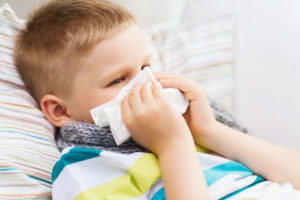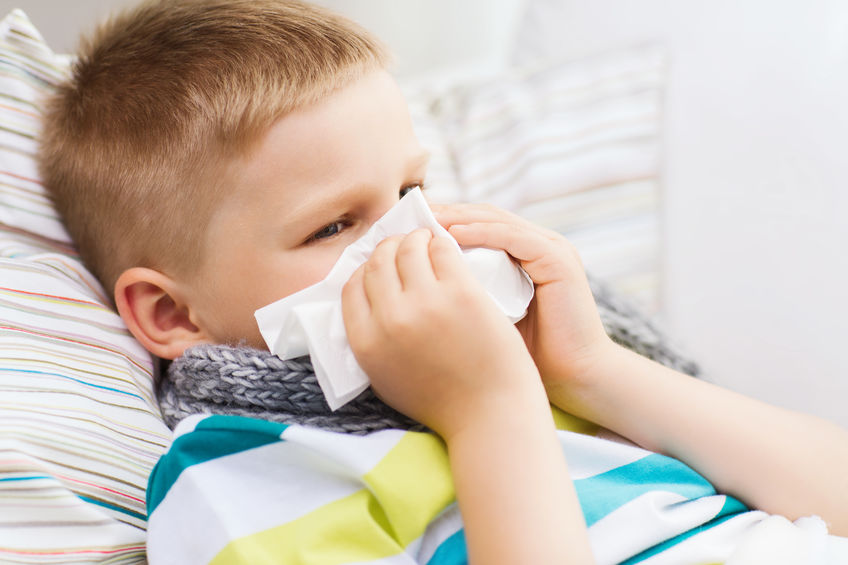
Cold and flu season is officially upon us. With COVID-19 and respiratory syncytial virus, known as RSV, circulating, it’s important to know the differences between common childhood illnesses so you can protect your family this winter.
“There have been recent upticks in flu, RSV and COVID-19, so the peak of cold and flu season, which typically runs from October to March, is definitely coming our way,” says Tina Scott-Mordhorst, M.D., a pediatrician at Children’s Physicians, Plattsmouth.
Dr. Scott-Mordhorst breaks down the symptoms and preventive measures you can take, and also provides guidance on what steps to take if your child gets sick.
Similar Symptoms — with Some Important Differences
Though colds, influenza, COVID-19 and RSV are each caused by different viruses, they all infect the respiratory tract. This is the part of the body that goes through the nose, down the mouth and throat, and into the lungs. Because of this, these illnesses share many symptoms, but there are a few key differences among them.
| Colds | Flu | COVID-19 | RSV |
|---|---|---|---|
|
|
|
|
The common cold tends to be mild. Fevers, headaches and chills are uncommon, while coughing usually remains mild to moderate. RSV, which affects the upper and lower respiratory tract, typically resembles a cold, although infants younger than six months may not show signs. If they do, their symptoms can be a little different, including irritability or fussiness, low activity levels, and stops and starts in their breathing.
“RSV can be really dangerous for infants,” says Dr. Scott-Mordhorst. “We might think it’s just a cold or allergies because that’s how it presents for us as adults or even in children, but it can be very serious for infants.”
The flu and COVID-19 can be a little tougher to differentiate. Both can range from showing no symptoms at all (called asymptomatic) to showing severe symptoms, and they both commonly include body aches and sore throats. However, one primary difference between the two is that COVID-19 can lead to changes in taste and smell.
The Timing of Symptoms Matters
While the symptoms may overlap a bit, their timing may help you determine which illness your child has. This is called the incubation period or how long it takes for symptoms to appear after exposure.
Though incubation periods can vary, they are roughly:
- 24 to 72 hours for a cold
- 1 to 4 days for the flu
- 2 to 14 days for COVID-19
- 4 to 6 days for RSV
Take Steps to Protect Your Family from Illness
The good news is that by taking action to keep yourself and your family safe from one illness, you can help protect yourselves from all of them.
Some of these preventive measures include:
- Washing hands often, especially after being in public, coughing or sneezing
- Avoiding large crowds and poorly ventilated areas
- Getting available vaccines
- Cleaning and disinfecting frequently touched surfaces, such as tables, doorknobs and light switches
Another piece of good news is, for the first time ever in the United States, preventive treatments are available for the flu, RSV and COVID-19.
The Flu Shot
With very few exceptions, the Centers for Disease Control and Prevention (CDC) recommends that everyone six months and older get a flu vaccine each year. Protecting your child from the flu not only helps reduce their risk of getting the flu but also their risk of severe illness if they do get sick.
While the best time to get the shot is by the end of October if you haven’t gotten it yet, it’s not too late. As long as the flu is still circulating, getting the vaccine can help.
RSV Therapy
The CDC recommends a new long-acting monoclonal antibody therapy called Nirsevimab for all infants younger than eight months old, as well as for some children between the ages of 8 and 19 who may be at increased risk for RSV. That includes kids with compromised immune systems.
In addition, there’s a new RSV vaccine the CDC recommends for pregnant women to protect their newborns from severe RSV after birth.
COVID-19 Vaccine
The CDC recommends an updated COVID-19 vaccine for everyone six months and older, saying the new vaccine will provide better protection against hospitalization and death from the variants currently circulating.
“Getting vaccinated is the one thing we can do to protect our families,” Dr. Scott-Mordhorst says. “It’s the one thing we can do to protect our communities. These vaccines are safe, but if you have concerns or are worried, have a conversation with your doctor or your kids’ doctor to address those concerns. Anything we can do to lessen the impact through the viral season can help.”
What to Do if Your Child Becomes Sick
While the common cold doesn’t generally lead to serious health problems, the flu, COVID-19 and RSV all can.
It’s important to take any sickness seriously because of the similarity of symptoms and that it’s possible to have more than one illness simultaneously. If you have an infant two months old or younger who develops a fever, take them to the doctor as soon as possible. “Their immune systems just aren’t as robust as those of kids and adults, or even older babies,” says Dr. Scott-Mordhorst.
If your child becomes sick, keep them home except to receive medical care. Most children can safely recover from all four illnesses at home, but if you’re concerned about severe symptoms, call your child’s primary care provider or Children’s COVID-19 Help Line at 402-955-3200. You can also log into Children’s Connect.
If you need help finding a provider, visit ChildrensNebraska.org/ChildrensPhysicians.
Your child’s doctor can help you determine next steps, which may include:
- Ensuring your child gets plenty of rest and extra fluids (especially babies who have RSV)
- Getting tested for COVID-19
- Giving your child over-the-counter medications to ease symptoms (if recommended by their provider)
- Monitoring your child for emergency symptoms, such as difficulty breathing, persistent pain, confusion, inability to wake up, and bluish lips or face



